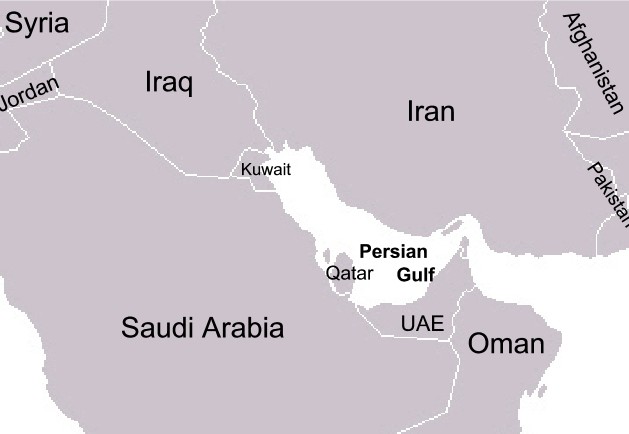by Aveek Sen
Iran’s Revolutionary Guards announced on July 20 that they had seized the British-flagged tanker Stena Impero in the Strait of Hormuz. It was seen as a tit-for-tat move in retaliation for the British detention of the Iranian tanker Grace 1 off Gibraltar earlier this month. This was only the latest of several provocative incidents in the Persian Gulf region over the past three months.
In May, four ships were attacked, apparently with limpet mines, in the Gulf of Oman. A month later two more vessels were attacked in the Gulf of Oman, for which the U.S. blamed Iran (Iran denied the charge). Shortly after that second attack, Iran downed a U.S. drone that allegedly entered its airspace. Donald Trump supposedly called back a retaliatory attack on Iran at the last minute. Earlier this month the U.S. claimed to have downed an Iranian drone that approached one of its naval vessels, a claim Iran also denied. The current volatility in the Persian Gulf is reminiscent of the days of the Iran-Iraq war in the 1980s.
LobeLog spoke with Joel Rubin, President of the Washington Strategy Group and a former Deputy Assistant Secretary of State. He says that “the situation is very tense and the tit-for-tat military back and forth is highly destabilizing. The region is a tinderbox. The American people oppose another American war in the Middle East, and the Iranians are being provocative. The danger is that there is no American policy beyond maximum pressure, which, rather than leading to a negotiation, is predictably leading us towards further conflict.”
Indeed it is the Trump administration’s “maximum pressure campaign”—begun last year when Trump pulled out of the 2015 Iran nuclear deal (Joint Comprehensive Plan of Action or JCPOA) and reimposed sanctions against Tehran—that has led to the current situation. Not only has that decision destabilized the Persian Gulf, it’s also led to an almost total unraveling of the JCPOA itself. With European leaders unable or unwilling to risk U.S. sanctions to protect Iranian commerce, Tehran has in recent weeks begun exceeding JCPOA limits related to its uranium enrichment program. That in turn has raised fears that Iran plans to abandon the agreement altogether.
Barbara Slavin, Director of the Future of Iran Initiative at the Atlantic Council, says that “this escalation is the direct result of the US decision to quit the Iran nuclear deal and try to impose an embargo on the export of Iranian oil. Even during the 1980s, the U.S. did not do that. Iran’s response, however, will only make a bad situation worse and risks touching off a new conflict with the U.S.”
From Iran’s perspective, however, it’s the UK that escalated tensions by seizing the Grace 1 at Gibraltar. In detaining the Stena Impero, the IRGC was only retaliating in kind. Iranian leaders do not seek further escalation, but neither are they willing to appear weak when challenged by Western countries.
Diako Hosseini, Director of the World Studies Program at the Center for Strategic Studies in Tehran, which is affiliated with Iran’s Presidential office, says that “it seems soaring tensions between Iran and the U.S. are gradually getting out of control. We are sleepwalking on the edge of war. The hawkish policies of the U.S. and recently the UK’s reckless decision in seizing the Iranian oil tanker in Gibraltar have provoked Iranian responses. Obviously, Iran doesn’t want war and doesn’t even want to elevate the crisis, but at the same time, it cannot stay aloof and allow itself to be intimidated by saber-rattling and to let its people be terrorized through sanctions. The United States and Britain should stop their provocations and instead open effective diplomatic channels to revive a necessary level of confidence. Otherwise, it’s expected that the chain reactions and mutual misreading would lead us into an inadvertent war.”
The UK is now spearheading a European coalition to protect shipping interests in the Persian Gulf. If Iran’s seizure of the UK vessel triggers a European backlash, it could spell the end of any European efforts to salvage the JCPOA and lead to even harsher sanctions against Tehran. Iran finds itself in a challenging position. On the one hand it has to defend its interests. On the other hand it has to ensure it is not acting so provocatively so as to provoke European leaders to join the Trump administration’s maximum pressure campaign. As it tries to walk the fine line between those extremes, volatility in the Persian Gulf is only likely to increase.
Aveek Sen is an independent journalist working on cybersecurity and the geopolitics of India’s neighborhood, focusing on Pakistan, Afghanistan, Iran, and Bangladesh. @aveeksen.






Aveek Sen, The opening statement discouraged me from reading the rest. What the hell is wrong with the Western media? It always leaves out the origin of the instigation by the aggressors and always blames those who are either defending themselves or the fact that others are put in the position to retaliate against the aggressors. A clear sign that the media in the west is a propaganda machine and no different than Pravda, complicit and corrupt to the core.
Worthless article!